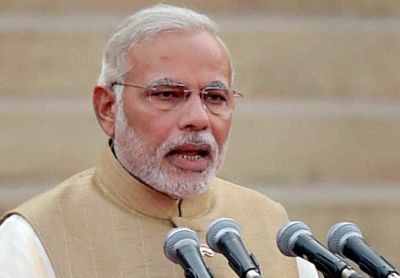
Why does Modi want to speak to the students while his audience should be teachers and parents, not necessarily in that order. And September 5 is not Children’s Day but Teachers’ Day, says Mahesh Vijapurkar.
Call it what you will -- Teachers’ Day, as was the case since the practice it began to mark Sarvepalli Radhakrishnan’s birthday -- or Guru Utsav, the new usage by the ministry of human resource development, the important thing would be what message Narendra Modi delivers to students and teachers on Friday.
It is risky to second guess what the newly-minted prime minister would say though it could be a safe bet he may opt for an alliterative catch word as is his wont. In Japan, he spoke of India’s three Ds: democracy, demography and demand which should encourage that country’s investment in India.
But mere homilies on education won’t do. It has been heard ad nauseum from academics and policy makers which have amounted to nothing much. Though, of course, the education system has changed a lot, and hopes, ambitions and aspirations have snowballed.
He shouldn’t tell the teachers that they are in a wonderful profession building the futures of the coming generations on Indians. Modi ought to instead ask them, especially in government schools, to deliver quality. If need be he should announce a programme to improve the academic standards of the teachers.
Also, talk to parents, especially of the first generation learners that longer their wards stay in school and learning is better for the families in the long run though that education can appear frustrating to poor families which would rather pull them out to earn. Parental causes for dropout rates need to be minimised.
Then why does Modi want to speak to the students while his audience should be teachers and parents, not necessarily in that order. And September 5 is not Children’s Day but Teachers’ Day. However the demand that students be exposed to his speech exposes how the HRD is not in touch with realities of the education system.
Schools sans blackboards cannot be flush with television sets enough for all students to listen to him. Majority of them don’t even have a quadrangle or a playground for an assembly, ruling out its mass viewing. Hiring TV sets is not easy. Schools can’t provide facilities on short order what couldn’t be in years under government superintendence.
Schools run in shifts due to scarcity of classrooms they cannot have all watching him en masse without creating a logistic nightmare. Even the one-shift schools don’t run in the same window of time during which he is going to hold forth. Moreover, HRD quibbles between “an order” and “an option” to heed it.
Apart from teachers and parents, especially of first generation learners, he needs to address state governments which have allowed publicly-funded schools to slide into ignominious quality standards and allowed private sector to step in -- ‘opening up the sector’ is how it is put -- making it a crass commercial proposition.
Providing education as a mission is missing from both government and do-good trusts which once ran schools for the sheer joy of running them and seeing generations learn and grow. Such schools don’t come up unless it has a commercial angle to it and is run by or with politicians’ patronage.
What policy initiatives he would enunciate to the children and teachers? And there is a lot required to be done in the sector which is in a complete mess. Given that Modi believes in skill development, the intellectual development of the students, and equity in delivering knowledge should be his focus.
He should take cues from the annual status reports which speak of abysmal standards we have. Students in the VII standard can’t read, it has been found, what they should have in the std II. Or do sums. India has no place in global surveys on reading, mathematics and science. English -- a window to the world -- is so poorly taught they cannot converse in it.
To start with, he should say that children won’t have to carry the burdensome backpacks to schools every day, and that the teaching would be so good that they would have little by way of homework. Equally important is to ensure uniformity of syllabus across states save the second language.
We have schools, but not enough of them, and not enough of them affordable. The belief that opening them up to private sector would resolve the continuing crisis has only accentuated it. Even the middle class is groaning under regular EMIs for the over-priced homes and the essential cars.
Education is slowly slipping out of the government’s ambit. The fact of the “international” tag taking them out of the authorities’ purview is a dangerous trend. They mushroom, making it fashionable. The cost of raising a child has become impossible to bear. Education has become a business.
This has evolved a culture where we see a student from a private school, never mind how expensive it is, as a class apart from those who go to government schools. In fact, he or she is that, because teaching, with teacher absenteeism and carelessness does not produce employable children.
Like them, there are classes of teachers. There are the proficient, committed, and also paid well. There are some who are that despite not being paid well in unaided schools. Then there are those with the Sixth Pay Commission emoluments but treat it as a sinecure sans accountability. Modi has to talk about that to them.
He has to acknowledge that four walls do not make a class room, nor the presence of a teacher, and in rural areas, the indifference of the teachers, make a school. The indifference is a major unattended worry. In fact the trend is ad hoc, short term appointments with pittance for salaries.
Students are only as good as the teachers are able to shape them, and teachers have to be respected but that does not come about by engaging them for carrying headcounts during census and other programmes. They need to be restricted to serve the society by producing good students.
Of course the teachers need to be told to measure up instead of merely toasting them. Given his image of being a task master who insists on delivery, who knows, things could change. India could have a better schooling programme with minimum further tinkering.











